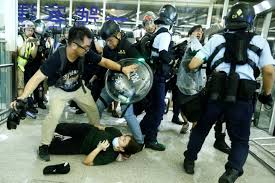WORLDVIEW: Gloves come off in Hong Kong

By Jonathan Power
The gloves are off in Hong Kong. Judging from the pictures on today’s BBC News the police no longer have any compunction about beating protestors. Ironically, they don’t appear to get close to the fringe of protestors who are using violent tactics. Rather they are swinging their batons left to right and center at any young person they meet, even chasing them on to the metro trains where commuters get thwacked too.
It reminds me vividly of the tough sheriffs of Alabama and Mississippi in the 1960s who used dogs against the civil rights protestors and cracked heads.
It reminds me too of 1968 when the Soviet Union sent its tanks into Budapest to overthrow a reforming (but still communist) government only to meet defiance from large sections of the population.
On both occasions, the brutality was met not with petrol-bombs and stones but with non-violence and passive obstruction. It worked. Stones and fire-bombs would have been counterproductive.
The combined strength of the troops of the Soviet Union and its allies was 500,000. For six days the Czech people met their invaders as fellow communists face to face, sometimes arguing with them, sometimes scorning them, always resisting them and refusing to obey their orders. The reaction was totally spontaneous. The improvised radio broadcasts during the first hours of the invasion simply told the populace not to use force and to keep calm.
Slogans were painted on the walls and tanks, and the removal of street signs must have made it clear to many Soviet soldiers that things were not quite as they had been told. When the tanks tried to cross railways lines the barriers came down. When the Soviets turned up at local Communist Party meetings the last business was read out and the meeting closed.
One of the most remarkable aspects of the resistance was the part played by radio and television. Not only were they a vital link to the outside world that made the Russians realize they were playing to a world theatre, but they became almost the guiding hand of the Czech people. Perhaps the most dramatic directive the Czech radio gave to the passive resistance campaign was an appeal to delay the Russian train that was bringing in radio jamming equipment. As a result, the train was first held up in a station, then stopped on a mainline because of a “failure” in the overhead electricity supply. Finally, it was routed onto a branch line with immobile locomotives blocking its way at each end.
So effective were the non-violent activities that the occupiers began rotating their troops- a clear sign that they were worried about the demoralizing effect that the resistance was having on their men. Indeed, some Russian soldiers who were known to be alive were declared dead to their families: they had seen or said too much and were sent to the far end of the Soviet Union.
Although non-violent resistance had never before occurred on such a scale and with such effectiveness in a country under military occupation, it was not enough. The backbone of the resistance did eventually collapse. Nonetheless, much was achieved that would have been considered impossible on the morning of the invasion. Some of the liberal reforms remained intact. More important, the workers continued for a long time to refuse to help the regime imposed by Russia out of its economic difficulties. Not overtly but, for instance, by making a virtue out of absenteeism, turning up for a week’s work on Monday lunchtime and knocking off on Friday lunchtime.
The political price the Kremlin had to pay was exorbitant- a breaking of the ranks by many of the world’s Communist Parties, including the important Italian, British and Spanish ones. There was disillusionment among most of Europe’s left-inclined intellectuals. Not that everybody in the Soviet orbit was happy with the invasion in the first place but what forced even some of the Kremlin’s friends into public disagreement was the widespread popular non-violent resistance. Perhaps the most important result was that the Czechs found new confidence in each other. Later the Czechs were instrumental in ending Soviet power in Eastern Europe.
Martin Luther King’s marches, boycotts, rallies, confrontations with thuggish police forces and King’s powerful oratory pushed the government and Congress into passing the Civil Rights Act and the Voting Rights Act. The path they laid led later to the election of Barack Obama as president.
The protestors in Hong Kong should learn from all this. They must isolate the violent protestors and explain to them why their methods will lead to more police violence and probable invasion by Chinese police and even troops. If necessary they must organize to disarm them. King did this with his violent fringe.
In the end, non-violent persistence might make China concede a timetable for attaining democracy.





